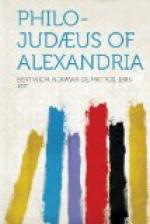Philo belonged to the most distinguished Jewish family of Alexandria,[41] and according to Jerome and Photius, the ancient authorities for his life, was of the priestly rank; his brother Alexander Lysimachus was not only the governor of the Jewish community, but also the alabarch, i.e., ruler of the whole Delta region, and enjoyed the confidence of Mark Antony, who appointed him guardian of his second daughter Antonia, the mother of Germanicus and the Roman emperor Claudius. Born in an atmosphere of power and affluence, Philo, who might have consorted with princes, devoted himself from the first with all his soul to a life of contemplation; like a Palestinian rabbi he regarded as man’s highest duty the study of the law and the knowledge of God.[42] This is the way in which he understood the philosopher’s life[43]: man’s true function is to know God, and to make God known: he can know God only through His revelation, and he can comprehend that revelation only by continued study. [Hebrew: v-nbi’ lbb hkma], God’s interpreter must have a wise heart,[44] as the rabbis explained. Philo then considered that the true understanding of the law required a complete knowledge of general culture, and that secular philosophy was a necessary preparation for the deeper mysteries of the Holy Word. “He who is practicing to abide in the city of perfect virtue, before he can be inscribed as a citizen thereof, must sojourn with the ‘encyclic’ sciences, so that through them he may advance securely




